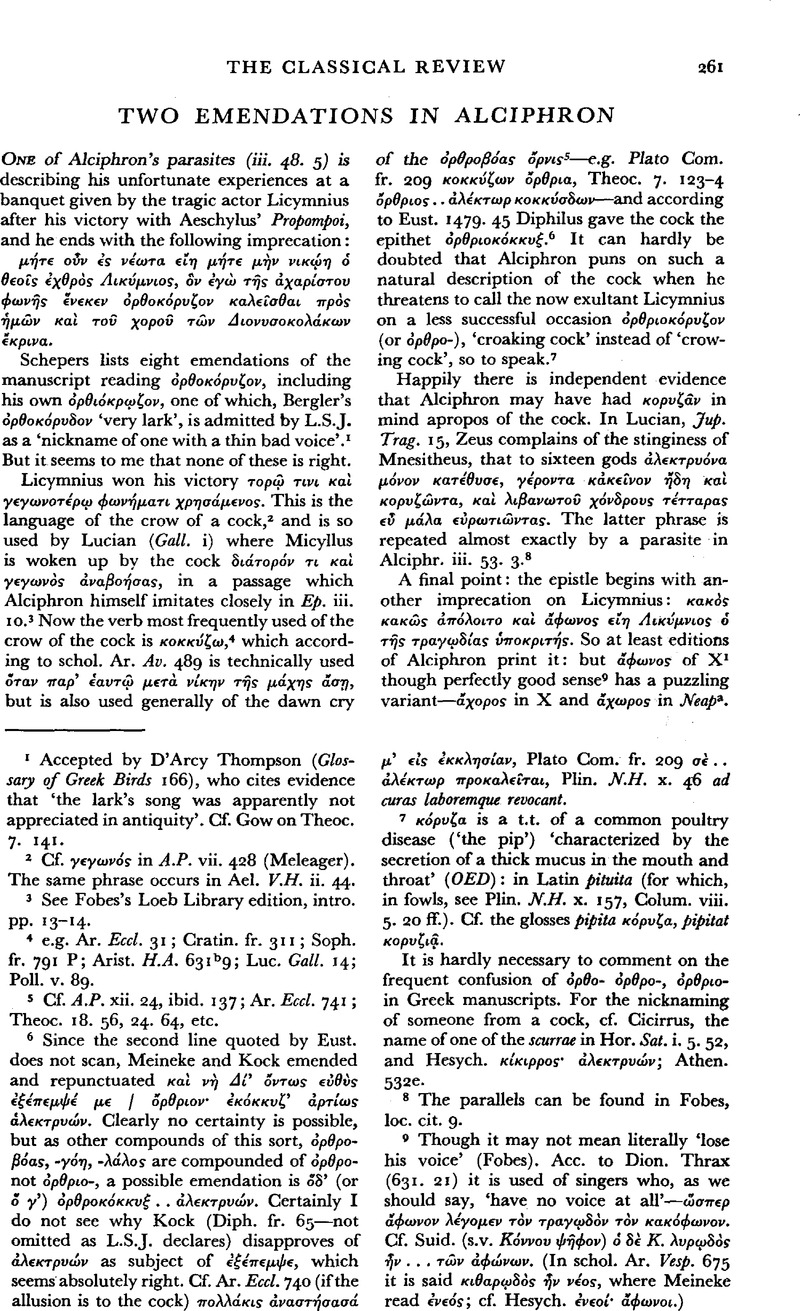No CrossRef data available.
Published online by Cambridge University Press: 27 February 2009

1 Accepted by D'Arcy Thompson (Glossary of Greek Birds 166), who cites evidence that ‘the lark's song was apparently not appreciated in antiquity’. Cf. Gow on Theoc. 7. 141.
2 Cf.γεγωνό in A.P. vii. 428 (Meleager). The same phrase occurs in Ael. V.H. ii. 44.
3 See Fobes's Loeb Library edition, intro. pp. 13–14.
4 e.g. Ar. Eccl. 31; Cratin. fr. 311; Soph, fr. 791 P; Arist. H.A. 631bg; Luc. Gall. 14; Poll. v. 89.
5 Cf. A.P. xii. 24, ibid. 137; Ar. Eccl. 741; Theoc. 18. 56, 24. 64, etc.
6 Since the second line quoted by Eust. does not scan, Meineke and Kock emended and repunctuated καὶ νὴ Δί' ὄντως εὐθὺς ἐξέπεμψέ με / ὄρθριονׁ ἐκόκκυζ' ἀρτίως ἁλεκτρυών. Clearly no certainty is possible, but as other compounds of this sort, ὀρθρο βόας, -γόη, λάλος are compounded ofὀρθρ-not-ὀρθριο, a possible emendation is ὅδ (or ὅ γ᾽) ὀρθροκόκκυξ..ἀλɛκτρυών. Certainly do not see why Kock (Diph. fr. 65—not omitted as L.S.J. declares) disapproves ofἐλεκρυών as subject of ἐΞέπεμφε, which seems absolutely right. Cf. Ar. Eccl. 740 (if the allusion is to the cock) πολλάκις ἀναστήσασά μ' εἰς ἐκκλησίαν, Plato Com. fr. 209 σὰ ‥ ἀλέκτωρ προκαλεῖται Plin. N.H. x. 46 adcuros laboremque revocant.
7 κόρυζαis a t.t. of a common poultry disease (‘the pip’) ‘characterized by the secretion of a thick mucus in the mouth and throat’ (OED): in Latin pituita (for which, in fowls, see Plin. N.H. x. 157, Colum. viii. 5. 20 fT.). Cf. the glosses pipitaκόρυζα, pipitatκόρυζιᾆ.
It is hardly necessary to comment on the frequent confusion of ὀρθο-ὀρθρο-ὀρθριο- in Greek manuscripts. For the nicknaming of someone from a cock, cf. Cicirrus, the name of one of the scurrae in Hor. Sat. i. 5. 52, and Hesych.κίκιρρος ἀλεεκτρυών Athen.532e.
8 The parallels can be found in Fobes, loc. cit. 9.
9 Though it may not mean literally ‘lose his voice’ (Fobes). Ace. to Dion. Thrax (631. 21) it is used of singers who, as we should say, ‘have no voice at all’—ὥσπερ ἄφωνον λέγομεν τὸν τραγῳδόφωνον. Cf. Suid. (s.v. Κόννου ψῆφον) ὁ δὲ Κ. λυρῳδὸς ἦν … τῶν ἀφώνων. (In schol. Ar. Vesp. 675 it is said κιθαρῳδὸς ᾖν νέος, where Meineke readἰνεόςcf. Hesych.ἰνεόί ἄφωνοι.)